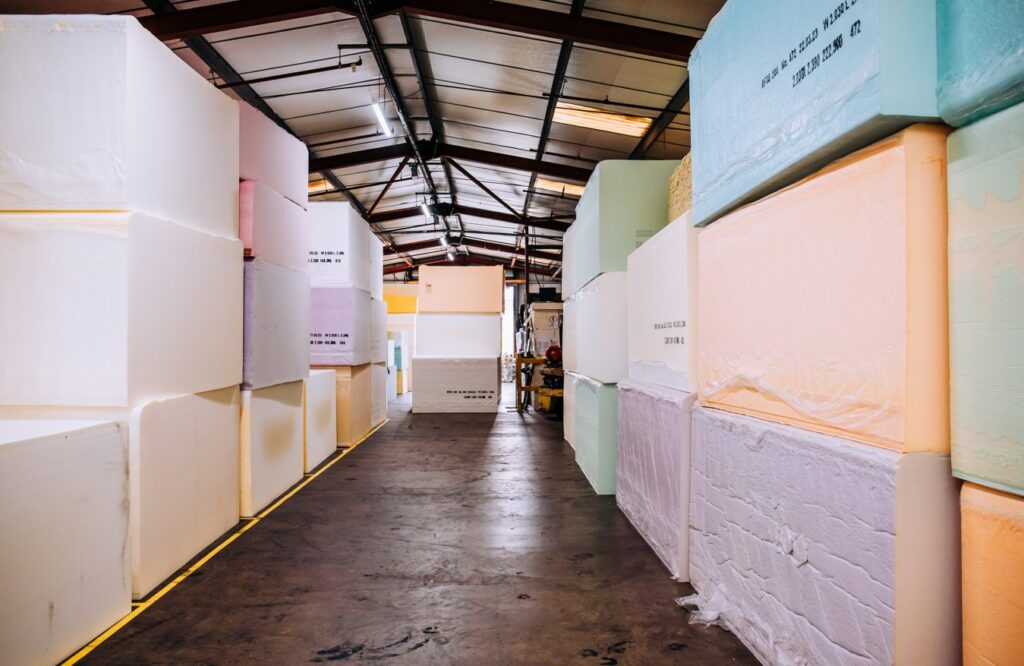Peak Converters opened up the factory doors where we got a chance to explore behind the scenes at the UK’s leading foam and fibre converter.
Nestled in the picturesque market town of Wirksworth, surrounded by the stunning Derbyshire Dales landscape, Peak Converters combines its tech-savvy approach to modern-day manufacturing while keeping its local charm, fostered from the community.
It’s this sense of community that has allowed Peak to thrive over the years, with staff retention and multi-skilling a big focus at the business. In fact, 70% of Peak’s workforce has served over five years or more, with over half living locally, while the company has an average of 12.5 years of service per employee – that’s some stat!
The scenery provides an idyllic setting – who wouldn’t want to work in such a location? But it’s much more than that, which was evident when walking through the 92,900sqft factory, seeing the smiles on every face as production was all systems go. It’s something that Mike Crowshaw, Managing Director, really encourages – a happy workplace leads to positive productivity.
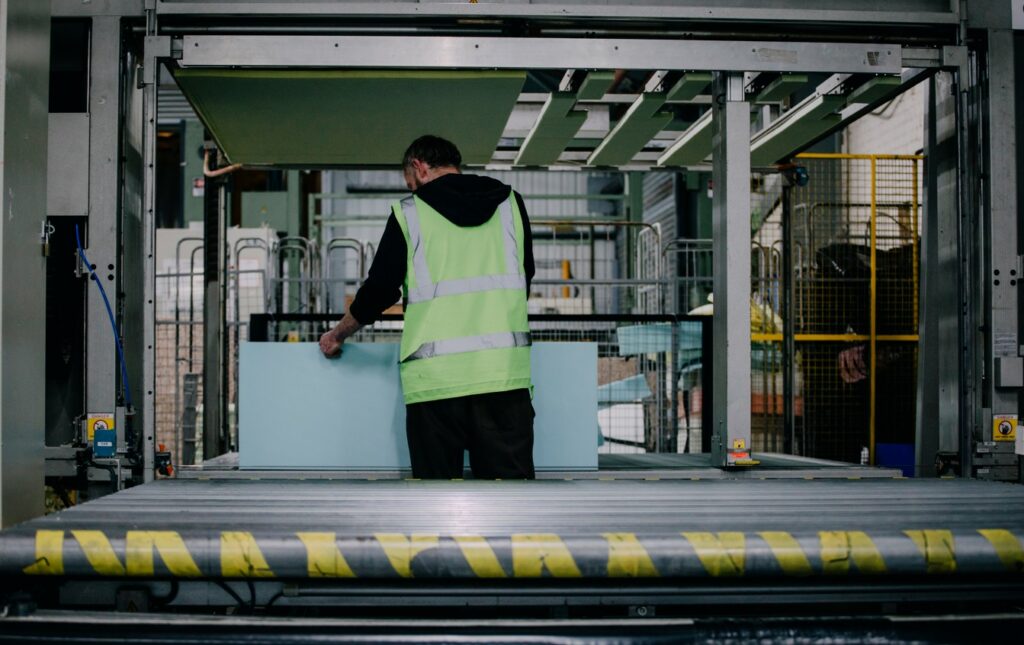
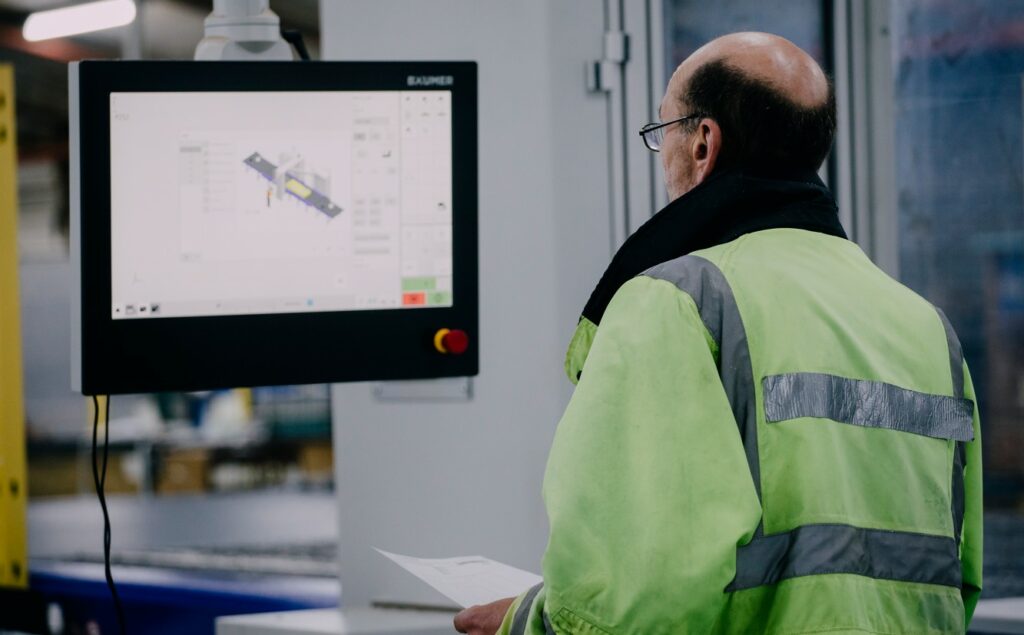
“We are really proud of all of our team members and take pride in knowing that over half live locally to our beautiful corner of the Derbyshire Dales. Back in June this year, we marked our 5-year anniversary with a company wide celebration.
“The last five years have been transformative for our business as we have re-focussed, built our team, invested heavily in improving our productivity, and become a more sustainable business. To mark the occasion, we wanted to thank all of our employees, especially those that have been with us for five or more years.”
A special thanks also went out to its longest serving employees, who have amassed a total of 151 combined years of service. Hats off to Clem Upton – Senior Team Leader (39 years’ service); John Davies – Sales Director (30 years’ service); Lorraine Kay – Supervisor (31 years’ service); Andy Prince – CAD Technician (26 years’ service); and Tracey Watson – Senior Team Leader (25 years’ service).
What this also highlights, is what Peak Converters as a company is like to work for. It’s a business that is committed to developing not only products and processes, but also the people. “We’re committed to continuing to invest in our workforce by implementing a multi-skilling program to enhance employee development,” says Mike.
“Everything we do is driven by a desire to be better and is executed by our team who have a wealth of knowledge developed over many years. We are immensely proud of our ability to retain staff.”
From the initial block storage zone, right the way through to final checks and loading for delivery, what was clear, was a very clinical operation. Everyone knows their role and how important it is to the wider process, from quality checking the foam blocks as they arrive to cutting, gluing, assembling and more.
Starting at the beginning, you’re greeted by another picturesque landscape – this time not the multi-coloured fields of the Derbyshire Dales, but the colourful blocks of foam and that create its own peak. Eager to get up close, just one memory foam block, as an example, comes in at 60 kilos per meter cube! These are then processed to a big-built-in floor scale to quality check the weight before being processed to the next stage of the factory. The blocks even have their own slide to enable this transition from storage to QC.
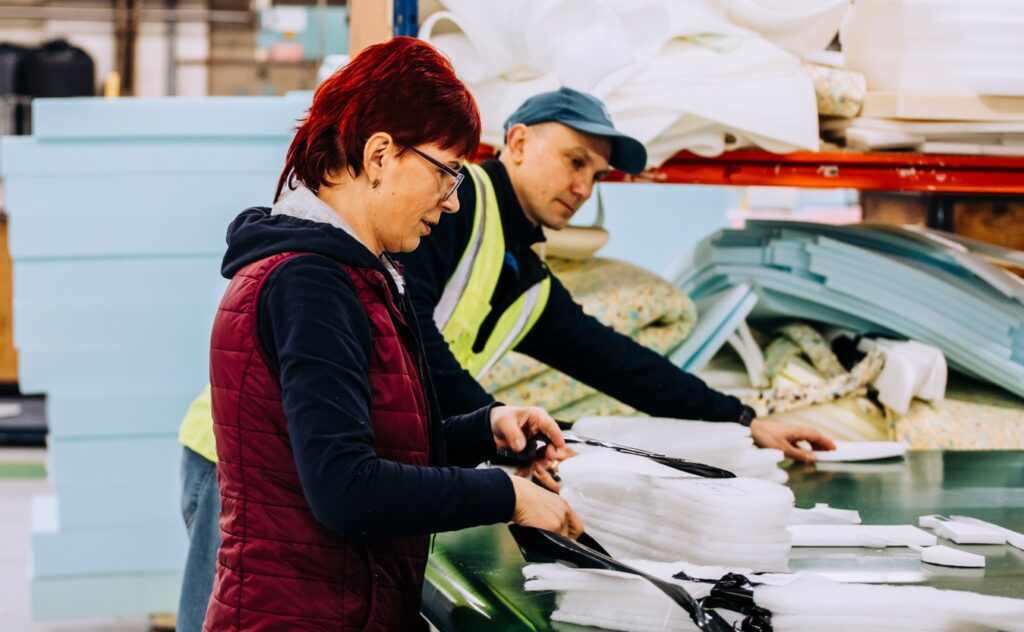
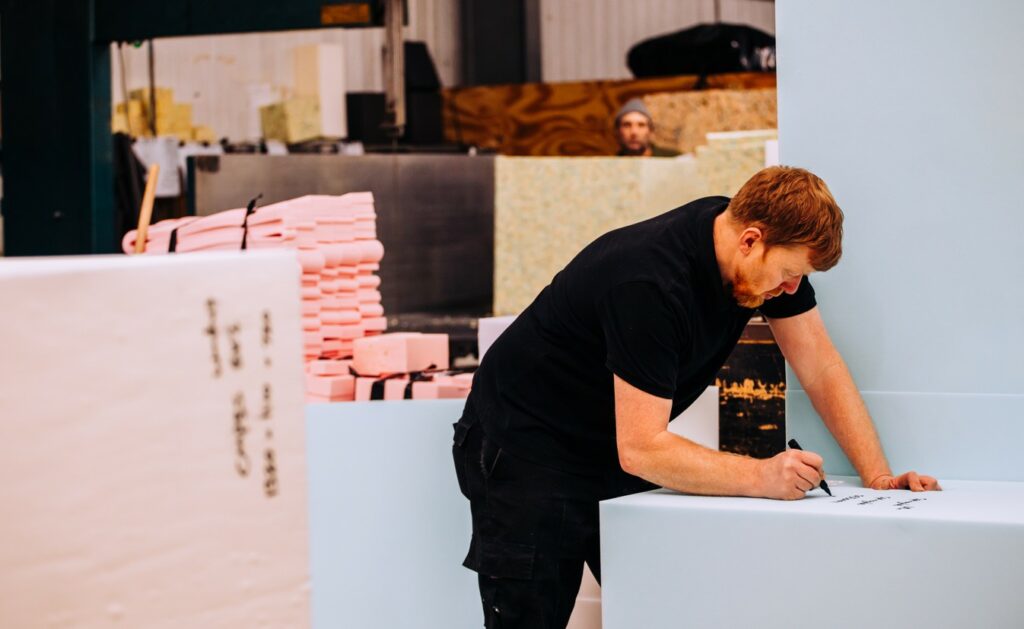
It was here a deeper understanding of the software systems involved across Peak’s entire operation were revealed. From the outset, traceability is paramount. “Using our unique software, we can track any foam used in future products,” says Mike. “Being able to trace foam back allows us to deal with any issues and we know exactly what was used and when.”
Due to the high quality of foam and fibres used, it’s actually extremely rare – if ever – a traceability issue is raised! The blocks are then moved on to the cutting area, where three large scale machines do all the heavy lifting – specifically programmed for a range of precise cuts. Mike revealed that compressed fibre has now overtaken foam – a shift the company has seen of late.
From cutting to identification – again using integrated technology, labels are used to identify which cuts go in what area, ready for the kitter and assembler teams to get to work. It’s a smooth, efficient clockwork process that is supported by a visual aid through Peak’s KPI monitoring software.
“Everything is monitored in real time via our KPI software screen in the centre of the factory,” Mike says. “Everyone can see progress made throughout the day, what targets are being achieved and what each area is doing. The data is live and can be drilled down into specific sections and orders for further detail.”
It’s a fascinating watch. The live data shows progress on Cutting, Assembly and Quality as well as a general homepage. As a snippet, this includes data on cutting runs per day, recuts, assembly figures with a target of over 7,000 per day, and in quality there was a neat statistic on total repurposed plastic bottles also displayed. At the time of the visit, it was just a ‘small’ figure of 668,000, and growing!
From plastic bottles to solar panels – 501 to be exact, Peak is committed to sustainability and has been working on other initiatives throughout the factory to improve its eco-credentials. “Since last Autumn, savings in energy from our solar panels equate to 21 tonnes of Co2 emissions, the same as planting 1,278 trees,” revealed Mike. “We often put energy we source back to the grid too, which includes around 40% of solar energy since April. We have completed our electric car investment where every car is now electric with charging stations at the factory, while we are also looking at potentially introducing electric trucks to our fleet.
“We are continuing to go paperless throughout the factory and we only have a few zones left, which will be completed by the end of this year and we’re constantly upgrading and investing in our machinery to make it more energy efficient too.
“We recently embarked on a major machine refurbishment programme, which includes upgrades to advanced machine monitoring software. These improvements are aimed at increasing production efficiencies, reducing lead times, and delivering even greater value to customers. Plans for the next few years include further investment in machinery and IIoT technologies to increase capacity and reduce machine downtime.”
Furthermore, Mike revealed some other “exciting” investments in the pipeline as well as how its latest spring cushion product launch is progressing. This will be covered in next month’s feature. For now, as the visit came to close, it’s clear to see why Peak Converters is known for its outstanding customer service and innovative, high-quality foam and fibre products.
“Since we relaunched as Peak Converters five years ago, we have made huge strides forward across all areas of the business,” Mike added. “From utilising next generation raw materials, to improving operating efficiencies, reducing lead times and modernising our staff facilities, we are continuing our exciting transformation journey.”


